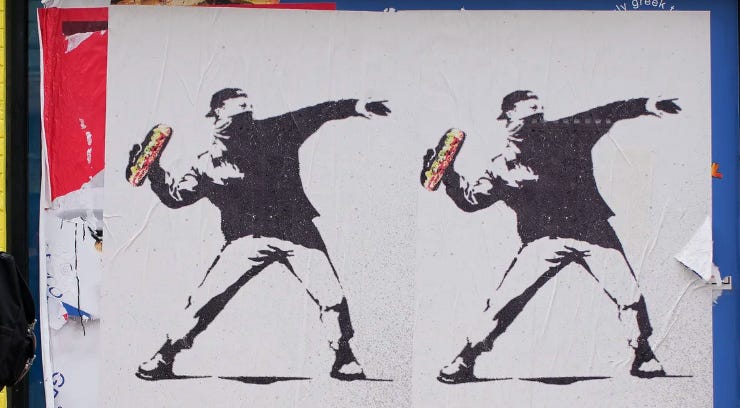|
 |
What happens when you indict a ham sandwich? The Justice Department is about to find out. Or, at least, find out what happens when you indict a salami sub.
Following jury selection yesterday, trial began today in the case of the Washington, D.C., man accused of throwing a salami sandwich at a federal agent. It’s ironic that yesterday was National Sandwich Day. Do federal judges have a sense of humor after all?
The defendant is 37-year-old Sean Dunn, a former DOJ paralegal, who was captured on video throwing a salami sub straight at a federal agent’s (well protected) chest. The video went viral last August, amid the earliest of Trump’s efforts to deploy National Guard troops on American streets. (Even though it’s only been two and a half months, it feels like it has been a lifetime in some ways. Refreshers here, here, and here.) Dunn was arrested on a complaint charging him with a felony assault on federal agents. The complaint alleged that “DUNN stood within inches of V-1 [victim one], pointed his finger in V-1’s face, and yelled, ‘Fuck you! You fucking fascists! Why are you here? I don’t want you in my city!’ DUNN continued his conduct for several minutes before crossing the street and continuing to yell obscenities at V-1.”
A grand jury subsequently declined to authorize felony charges. Artwork depicting Dunn as an emblem of resistance cropped up across the city.
The Justice Department subsequently brought misdemeanor charges, which do not require a grand jury’s approval. That’s the subject of today’s trial. The felony assault charge would have carried a penalty of up to eight years in prison. Misdemeanors carry a penalty of no more than a year.
Lawfare Senior Editor Molly Roberts deserves an award for her live tweets of the proceedings today. If you aren’t already, make sure you follow her for the conclusion of the case. Among the gems she shared:
“Defense begins with, ‘He did it. He threw the sandwich.’ Goes on to argue that the throw was ‘an exclamation mark at the end of a verbal outburst.’”
“The officer Sandwich Guy is charged with assaulting testifies that he could feel the impact of the sandwich through his ballistic vest, and it ‘exploded all over my uniform.’ He says he could ‘smell the onions and the mustard.’”
“Defense wants gag gifts provided to the officer after the incident included in discovery. One is a plushie sandwich and another is a patch that says, if I heard correctly, ‘Felony Footlong.’ Sounds like we won’t end up seeing these physically but will hear them described.”
“We’re back to the sandwich video. The paper, the defense points out, is still on. ‘You don’t see there’s mustard on it?’ ‘You can’t tell there’s ketchup on it?’ Mayonnaise? Lettuce? Tomato? ‘In fact, that sandwich hasn’t exploded at all?’ Witness says the sandwich ‘looks bent and out of shape.’”
You get the point, right? It’s the sort of prosecution that could make jurors legitimately wonder why they’ve been asked to make the sacrifice of spending time away from jobs and families to do justice…only to be asked to participate in this case.
Jury nullification occurs when a jury acquits a defendant even though they believe there is sufficient evidence to establish guilt, because they disagree with the law (as in simple possession marijuana cases, for example) or feel the punishment is unjust. These proceedings beg the question of whether jury nullification can ever be appropriate. In a “normal” rule-of-law world where prosecutors act from proper motives, following DOJ principles, and indict cases only when they believe they can obtain and sustain a conviction and when the prosecution serves federal interests, I’m not much of a fan of nullification. In this situation, I’ll leave it up to you to decide how you feel about it.
The point is frequently made that prosecutors can indict even a ham sandwich because they have so much control in the grand jury, and the burden of proof is set so low. Only prosecutors appear when they seek an indictment; a defendant has no right to present defenses and a counter-narrative. Prosecutors need only convince the grand jury that there is probable cause to proceed, reasonable grounds to believe that a crime has been committed and the defendant is responsible. Smart prosecutors, however, know they are facing a much higher burden of proof in front of a jury at trial and do not indict unless they are satisfied that they have proof beyond a reasonable doubt and the case merits federal prosecution.
Smart prosecutors.
No one is suggesting that throwing a sandwich at federal agents is a good idea. The question is whether it should be a federal crime. Even the grand jury didn’t think that was the case. They declined to indict.
“He did it, he threw the sandwich,” the defense lawyer’s opening comments to the jury started out. It’s a basic rule in court: Concede what you must. The sandwich throw is on video. But the defense lawyer made the parameters of the jury’s role clear: “You’re not going to be asked if you feel bad for the agent who took a sandwich to the chest. You’re going to be asked whether what happened that night is a federal crime.”
We’ll find out what the jury thinks when it deliberates.
Is this case a good use of federal resources? Might the community U.S. Attorney Jeanine Pirro’s office serves feel better served if they’d been used, for instance, to complete the investigation into border czar Tom Homan, who reportedly accepted a $50,000 bribe for steering government contracts to businessmen instead? Do we need to bring in the feds over a thrown sandwich? Perhaps the loss of the defendant’s job suffices as punishment.
I can only recall bringing misdemeanor charges one time in my 25 years as a federal prosecutor. The case involved defendants who defaced a Black church in a rural county with hateful graffiti and images that were found by schoolchildren heading over for Bible study on a Wednesday afternoon. We only had misdemeanor charges available. After much debate, we brought them because of the nature of the case and its victims. The defendants pled guilty.
Indicting the thrower of the sandwich is entirely different. Perhaps the government will get a hypertechnical conviction. More likely, at least some members of the jury will reject the government’s case, and the jury will hang, if not acquit. But the real question is why? Why diminish the public’s confidence in the Justice Department in such a meaningless way? It is one of the seminal questions of this administration.
If Civil Discourse helps you make sense of the legal news in a noisy world, please consider a paid subscription—it makes this work possible.
We’re in this together,
Joyce


